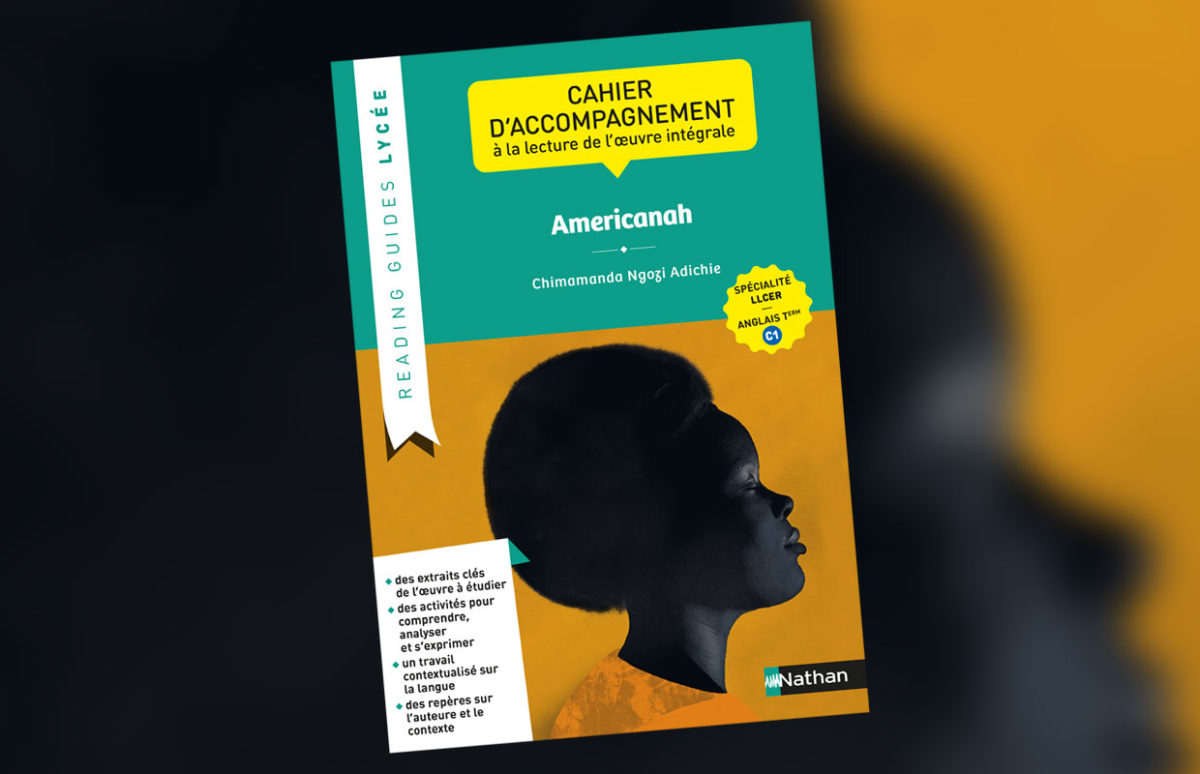Many of you asked if we would be producing a Reading Guide on Americanah by Chimamanda Ngozi Adichie, which is now on the LLCER Terminale curriculum. We are happy to announce that it is now at the printers and will be available in the middle of November.
Chimamanda Ngozi Adichie was born in 1977 and grew up in Nsukka, Nigeria, in the same university town where the renowned Nigerian writer Chinua Achebe, who inspired Adichie to become a writer, once lived. Adichie studied medicine in Nigeria before moving to the United States, where she first studied in Philadelphia and later at Yale University and Johns Hopkins University.
Her first novel, Purple Hibiscus (2003), won the Commonwealth Writers’ Prize. Her second novel, Half of a Yellow Sun (2006), set during the Biafran War, also called the Nigerian Civil War (1967-1970), received the Orange Prize for Fiction. She received the National Book Critics Circle Award for Fiction for Americanah (2013).
In addition to fiction, Adichie is known for her influential talks and essays, especially We Should All Be Feminists (2014), which is adapted from a TED Talk she gave in 2012 and that has been viewed 8 million times. Another of her TED talks, from 2009, "The Danger of a Single Story", is one of the most-watched TED Talks ever. In it, she warned that if we hear only a single story about another person or country, we risk a critical misunderstanding. She describes growing up, like many Nigerian children, immersed in British and American children's literature. So when she started writing stories as a child, "All my characters were white and blue-eyed, they played in the snow, they ate apples, and they talked a lot about the weather, how lovely it was that the sun had come out. Now, this despite the fact that I lived in Nigeria."
Adichie’s writing combines storytelling with social commentary, encouraging readers to think critically about history, culture, gender, and power. She now divides her time between the United States and Nigeria, and is recognised as a central literary voice of the twenty-first century.
Spoilers ahead!
Americanah
“Americanah” is a term to describe a Nigerian (or more broadly an African) person who has lived in the United States for a long time and has adopted some aspects of American culture. It is usually used ironically. As Adichie's novel draws on her own experiences, the term could be apply to herself, but it is certainly true of Ifemelu, her main protagonist.
The novel moves back and forth in time, starting with Ifemelu reflecting on her many years in the U.S.A., where she first came to study when conditions in Nigeria made it impossible to finish her degree. Having studied, loved, worked, and obtained citizenship in the U.S.A., she is on the verge of returning to live in her home country. We are shown scenes of her earlier life in Nigeria, where she and Obinze fell in love at high school, and where Aunty Uju, Ifemelu's relative, could only get work as a doctor by becoming the mistress of a powerful general.
In Americanah, Chimamanda Ngozi Adichie examines how blackness is different for African Americans and Africans living in America. Her character Ifemelu didn’t realise she was black in her native country — she fit that description only after she landed in America. She later wrote a popular blog called "Raceteenth, or Various Observations About American Blacks (Those Formerly Known As Negroes) By a Non-American Black." Blog posts punctuate the novel, as do Ifemelu's reflections on the pressure put on her and others to force their hair into a Western ideal of beauty.
Both Ifemelu and Obinze, who spends time in the U.K. before being deported back to Nigeria, feel out of place in their adopted countries. But when she joins the reverse brain drain and returns to Lagos, Ifemelu discovers she doesn't feel completely at home there either.
You can find out more about our Reading Guide and see an extract on the Nathan site.
While you wait for the Reading Guide, you can find out more about Chimamanda Ngozi Adichie and hair empowerment in Shine Brighter 2e File 9 #EveryBODY. There is an extract of a speech on feminism by Adichie in Shine Bright LLCE File 3 Brave New Women.
> Reading Guides LLCER Terminale
> New Reading Guide: Pride and Prejudice
Tag(s) : "brain drain" "Chimamanda Ngozi Adichie" "coming-of-age" "first love" "LLCER" "love stories" "migration" "Nigeria" "Reading Guides" "reverse brain drain" "Shine Brighter 2e" "U.K." "U.S.A."






